-
ORIGINAL ARTICLE01-10-2024
Nursing students and the internet: a reflection of digital ethics
Revista Brasileira de Enfermagem. 2024;77:e20230459
Abstract
ORIGINAL ARTICLENursing students and the internet: a reflection of digital ethics
Revista Brasileira de Enfermagem. 2024;77:e20230459
DOI 10.1590/0034-7167-2023-0459
Views0See moreABSTRACT
Objectives:
to identify how first-year nursing students use cyberspace and propose an orientation guide with criteria guiding the use of cyberspace.
Methods:
qualitative and descriptive research, carried out with 24 nursing students from a federal public institution in Rio de Janeiro. Data collection was carried out through semi-structured interviews. Data analysis occurred using IRAMUTEQ®. The research was approved by the institution’s Research Ethics Committee.
Results:
students use cyberspace to communicate, study, find “cool things”, share photos and memories. Furthermore, they are concerned about hate speech, intolerance and fake news. The good and bad sides and the types of technologies most used were also portrayed.
Final considerations:
the moral and ethical values of physical coexistence, together with awareness of individual responsibility, are the pillars for using cyberspace. The guide comes as an awareness tool.

-
ORIGINAL ARTICLE01-10-2024
Maternity behind and beyond bars: analysis from the perspective of protection bioethics
Revista Brasileira de Enfermagem. 2024;77:e20220576
Abstract
ORIGINAL ARTICLEMaternity behind and beyond bars: analysis from the perspective of protection bioethics
Revista Brasileira de Enfermagem. 2024;77:e20220576
DOI 10.1590/0034-7167-2022-0576
Views0See moreABSTRACT
Objective:
to analyze how motherhood is expressed in female prison units from the perspective of Bioethics of Protection.
Method:
qualitative research with an ethnographic approach, developed in two women’s prison units. Participantes were: six mothers deprived of liberty, 15 health professionals, and nine prison officers. For data collection, semi-structured interviews and descriptive observation were used. Data analysis was based on the Content Analysis technique, thematic category.
Results:
three categories emerged: women and children violated behind bars (inequities); mothers and children in prison exacerbating imbalances, tensions and conflicts; and limits and references for resocialization.
Final Considerations:
the Bioethics of Protection proposal appears as a valid tool for the analytical direction of the process of confronting issues in the scope of public health in prison units, considering vulnerable groups and aiming at equity and human dignity.
-
ORIGINAL ARTICLE01-10-2024
Self-harm in the two years of greatest restrictions during the covid-19 pandemic: a cross-sectional study
Revista Brasileira de Enfermagem. 2024;77:e20240289
Abstract
ORIGINAL ARTICLESelf-harm in the two years of greatest restrictions during the covid-19 pandemic: a cross-sectional study
Revista Brasileira de Enfermagem. 2024;77:e20240289
DOI 10.1590/0034-7167-2024-0289
Views0See moreABSTRACT
Objective:
to analyze occurrence of self-harm, sociodemographic profile of victims and referrals in the first 24 months of the COVID-19 pandemic in São Paulo.
Method:
cross-sectional study carried out by the Notifiable Diseases Information System with data on self-harm in São Paulo. The period outlined was March 2020 to February 2022. R (4.0.2) software and chi-square test were used.
Results:
there were 15,946 incidents. Victims were young, white, single, heterosexual women. There was high incidence of people with previous mental disorders more than once and without clear motivation. The method used was poisoning/intoxication. There was a considerable number of referrals to the health network, although not totalitarian.
Conclusion:
the years of greater insecurity in relation to the pandemic have given rise to self-harm cases with peculiar characteristics. Agile health policies must be applied in atypical conditions, such as pandemics, especially for adolescents/young people with previous mental disorders.
-
EXPERIENCE REPORT01-10-2024
Sustainability in Higher Education: Experience report on achieving Sustainable Development Goals
Revista Brasileira de Enfermagem. 2024;77:e20240118
Abstract
EXPERIENCE REPORTSustainability in Higher Education: Experience report on achieving Sustainable Development Goals
Revista Brasileira de Enfermagem. 2024;77:e20240118
DOI 10.1590/0034-7167-2024-0118
Views0See moreABSTRACT
Objective:
Describe the activities aimed at achieving the Sustainable Development Goals (SDGs), implemented by a polytechnic higher education institution, in the northern region of Portugal.
Methods:
This is an experience report from a Higher Education Institution, which characterizes the contribution to the SDGs, within the scope of teaching, research, campus and leadership.
Results:
In total, 1247 activities were mapped, with a preponderance in the “people” dimension (685 activities), with SDG 3 being the most prominent. Scientific articles contribute significantly to the SDGs, with a notable discrepancy between automatic (Scopus) and manual classifications, indicating a tendency to underestimate the impact of nursing studies.
Conclusion:
The results demonstrate the significant contribution of this institution to the SDGs, with a special focus on health and education. This contribution reflects the mission of the institution, which involves training competent and socially conscious health professionals, but simultaneously the need for greater awareness and training of the teaching staff.

-
REVIEW01-10-2024
Health of quilombola children as a challenge for the Sustainable Development Goals: a scoping review
Revista Brasileira de Enfermagem. 2024;77:e20240106
Abstract
REVIEWHealth of quilombola children as a challenge for the Sustainable Development Goals: a scoping review
Revista Brasileira de Enfermagem. 2024;77:e20240106
DOI 10.1590/0034-7167-2024-0106
Views0See moreABSTRACT
Objective:
to map the literature on quilombola children’s health and its relationship with the Sustainable Development Goals.
Method:
a scoping review, which followed the JBI protocol and the Preferred Reporting Items for Systematic reviews and Meta-Analyses extension for Scoping Reviews. Searches were conducted in the LILACS, BDENF, Web of Science, Scopus, MEDLINE databases and Google Scholar platform. The research protocol was registered in the Open Science Framework.
Results:
eighteen articles out of 2,055 studies were selected as relevant for this study. The articles were grouped into four axes: Access to healthcare services; Nutritional aspects of quilombola children; Health problems of quilombola children; and Care for quilombola children. The relationship between these articles and SDGs 1, 3, 4, 6 and 10 was observed.
Final considerations:
the study provided an extremely important mapping of the theme of quilombola children’s health and themes related to the Sustainable Development Goals.

-
ORIGINAL ARTICLE01-10-2024
Social Representations of pregnancy among trans men
Revista Brasileira de Enfermagem. 2024;77:e20240094
Abstract
ORIGINAL ARTICLESocial Representations of pregnancy among trans men
Revista Brasileira de Enfermagem. 2024;77:e20240094
DOI 10.1590/0034-7167-2024-0094
Views0See moreABSTRACT
Objective:
to understand the meanings and experiences of pregnancy among trans men in light of the Theory of Social Representations.
Methods:
this is a qualitative, descriptive and exploratory study, carried out with trans men selected for convenience and availability. Data production took place from September to October 2021, via the Google Meet® platform, based on interviews with a semi-structured script. Interview lexicographic textual analysis was performed using the Reinert method and instrumented by IRAMUTEQ version 7.0.
Results:
social representations of pregnancy involved a wide field of meanings, in which efforts were articulated to accept opportune and solitary pregnancy, fear of the parturition process and influence of physical and emotional changes.
Final considerations:
the study reinforces the importance of advanced nursing practice in assisting the pregnancy-puerperal cycle, based on the perspective of comprehensive care, equity in access to services and respect for differences.
-
REVIEW01-10-2024
Prevalence and exposure variables of latent infection by mycobacterium tuberculosis in healthcare workers
Revista Brasileira de Enfermagem. 2024;77:e20240052
Abstract
REVIEWPrevalence and exposure variables of latent infection by mycobacterium tuberculosis in healthcare workers
Revista Brasileira de Enfermagem. 2024;77:e20240052
DOI 10.1590/0034-7167-2024-0052
Views0See moreABSTRACT
Objectives:
To identify in the scientific literature the prevalence, diagnostic methods, and exposure variables of latent infection by Mycobacterium tuberculosis in healthcare workers.
Methods:
An integrative review of the scientific literature based on the following review question: What are the available scientific evidence in the literature that address the prevalence of latent infection by Mycobacterium tuberculosis in healthcare workers and its association with possible risk factors among these workers?
Results:
Being a physician or nurse, being older, and being male were generally associated with higher prevalences. The study also showed that interferon-gamma release assays were more commonly used as a diagnostic method compared to skin tests.
Conclusions:
More studies are needed regarding the epidemiology of latent infection by Mycobacterium tuberculosis in the context of healthcare workers, aiming for higher impact actions that contribute to the reduction of tuberculosis worldwide.

-
ORIGINAL ARTICLE01-10-2024
Brazil-Portugal Comparison: Education, Health and Social Development in light of the Sustainable Development Goals
Revista Brasileira de Enfermagem. 2024;77:e20240047
Abstract
ORIGINAL ARTICLEBrazil-Portugal Comparison: Education, Health and Social Development in light of the Sustainable Development Goals
Revista Brasileira de Enfermagem. 2024;77:e20240047
DOI 10.1590/0034-7167-2024-0047
Views0See moreABSTRACT
Objective:
to comparatively analyze the health, education and social development systems of Brazil and Portugal, their relationship with the Sustainable Development Goals and the Organization for Economic Cooperation and Development averages.
Method:
exploratory and descriptive qualitative research, through documentary analysis. The indicators address health, education and social development, considering life expectancy, mortality, prevalence of chronic diseases, literacy, educational performance and poverty rates.
Results:
indicate significant differences between countries. Portugal presents better indicators in life expectancy, educational quality and poverty rates, whereas Brazil faces greater challenges in chronic diseases and equity in access to healthcare services.
Final considerations:
the importance of public policies adapted to local realities and the need for a strategic vision for healthcare systems aligned with the Sustainable Development Goals, in addition to the need for continuous investments and integration of digital health for efficient and equitable systems, stand out.
-
RESEARCH01-01-2017
Impact of home visits on the functional capacity of patients with venous ulcers
Revista Brasileira de Enfermagem. 2017;70(2):287-293
Abstract
RESEARCHImpact of home visits on the functional capacity of patients with venous ulcers
Revista Brasileira de Enfermagem. 2017;70(2):287-293
DOI 10.1590/0034-7167-2016-0291
Views0See moreABSTRACT
Objective:
to compare the impact of home visits, before and after instructions, on the functional capacity of adult and elderly patients with venous ulcers, by means of the KATZ-EIAVD Scale.
Method:
experimental, clinical, randomized, non-blind and controlled study, developed with 32 patients (case and control groups). The research settings were the Wound Care Clinic of the University Hospital Antonio Pedro, and the homes of patients assisted in this clinic. Data collection took place from February to June 2014, by means of a health unit evaluation tool, the KATZ-EIAVD Scale, and a script of instructions to be given to the research subjects that had received a home visit.
Results:
the studied population present excellent independence for activities of daily living, with no significant variation among them.
Conclusion:
the studied groups have functional capacity with similar progress.
-
RESEARCH01-01-2017
The elderly recognizing themselves as vulnerable to falls in the concreteness of the femoral fracture
Revista Brasileira de Enfermagem. 2017;70(2):279-286
Abstract
RESEARCHThe elderly recognizing themselves as vulnerable to falls in the concreteness of the femoral fracture
Revista Brasileira de Enfermagem. 2017;70(2):279-286
DOI 10.1590/0034-7167-2016-0392
Views0See moreABSTRACT
Objectives:
understand the experience of the elderly with falls followed by femoral fracture and elaborate theoretical model of this process of lived experience.
Method:
qualitative research with theoretical saturation through analysis of the ninth nondirected interview of elderly who underwent such experience. Interviews were recorded, transcribed, and analyzed according to Grounded Theory.
Results:
three categories emerged (sub-processes): evaluating signs and symptoms of fracture after the fall; feeling sad and insecure with the new condition; and finding oneself susceptible to fractures. From realignment of these categories (sub-processes) we could abstract the central category (process), recognizing oneself as vulnerable to falls in the concreteness of the fracture.
Conclusion:
the theoretical model considering the Symbolic Interactionism signals the implementation of continued program for fall prevention, with teaching strategies that encourage the elderly to reflect on the concreteness of contexts in which there is risk of occurring injury to their health.
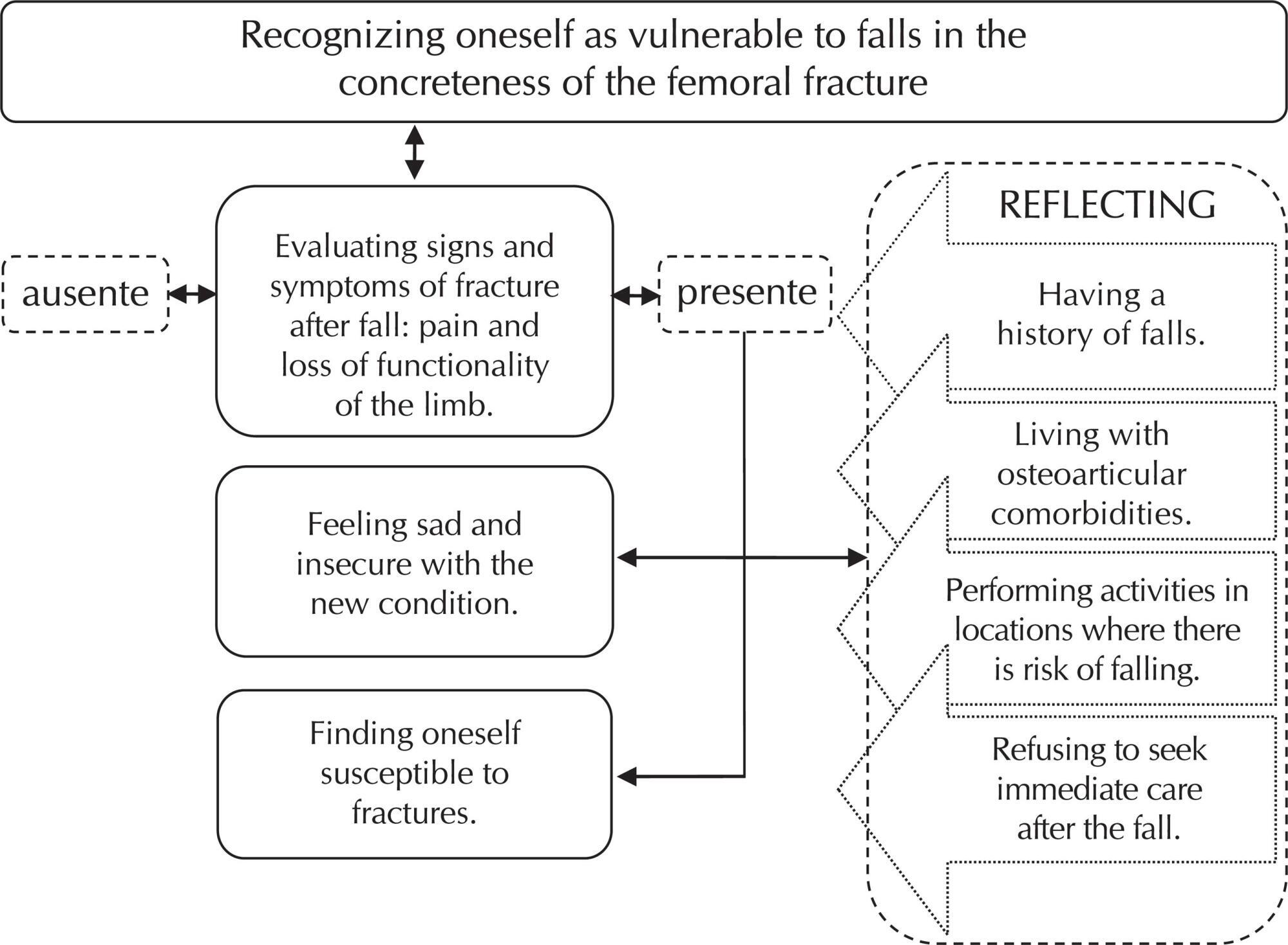
-
RESEARCH01-01-2017
Self-esteem and health-related quality of life in ostomized patients
Revista Brasileira de Enfermagem. 2017;70(2):271-278
Abstract
RESEARCHSelf-esteem and health-related quality of life in ostomized patients
Revista Brasileira de Enfermagem. 2017;70(2):271-278
DOI 10.1590/0034-7167-2016-0161
Views0See moreABSTRACT
Objective:
to assess self-esteem (SE) and health-related quality of life (HRQoL) in ostomized patients due to colorectal cancer.
Method:
cross sectional research with a quantitative approach. Three instruments were used for data collection: one instrument containing sociodemographic and clinical data, Rosenberg’s Self-Esteem Scale, and the European Organization for Research and Treatment of Cancer Quality of Life Questionnaire.
Results:
SE and HRQoL were considered satisfactory. Significant statistical difference was found in the social function domain and marital status, ostomy duration, location, and time; global health scale and ostomy type; cognitive function and pain in the ostomy site. There was a correlation between self-esteem and all the functional scales and the global health scale.
Conclusion:
knowing SE and HRQoL levels, in addition to the variables that influence them, supports ostomized patients’ care planning, rehabilitation, and social autonomy.
-
RESEARCH01-01-2017
Prevalence of Metabolic Syndrome in individuals with Type 2 Diabetes Mellitus
Revista Brasileira de Enfermagem. 2017;70(2):265-270
Abstract
RESEARCHPrevalence of Metabolic Syndrome in individuals with Type 2 Diabetes Mellitus
Revista Brasileira de Enfermagem. 2017;70(2):265-270
DOI 10.1590/0034-7167-2016-0145
Views0See moreABSTRACT
Objective:
to identify the prevalence of Metabolic Syndrome and its components in a population of patients with type 2 Diabetes Mellitus.
Method:
a cross-sectional study was conducted with 201 diabetic patients. A descriptive analysis and Chi-square and Fisher’s exact tests ( p <0.05) were performed.
Results:
the majority of participants were females and overweight, with a mean age of 63.1 years and a low level of education, and categorized as physically inactive. Of all individuals investigated, 50.7% were diagnosed with Metabolic Syndrome and 92% had at least one of the syndrome components with values beyond those recommended.
Conclusion:
it is essential to take preventive actions and develop studies that help to identify the factors associated with this syndrome.
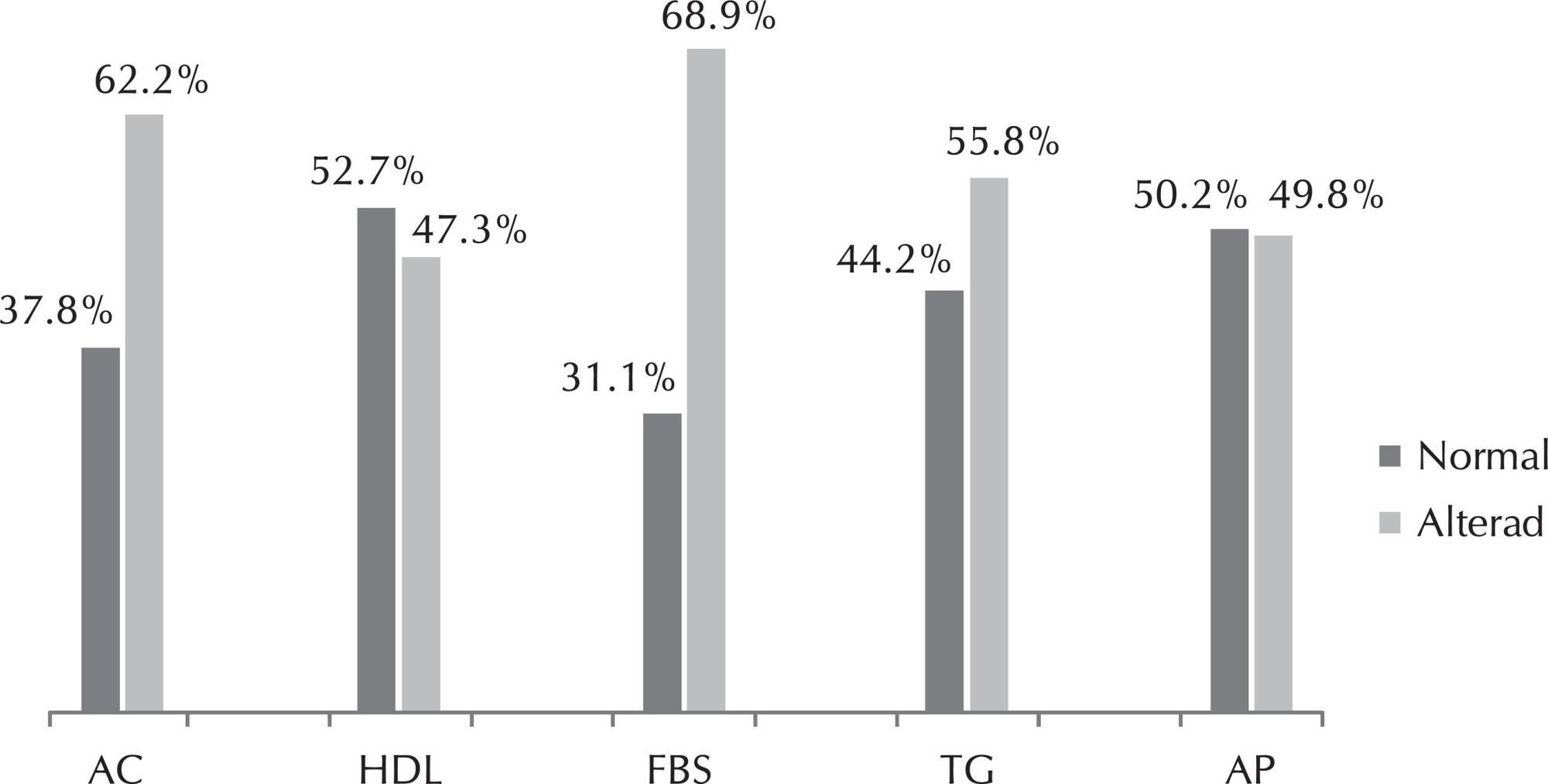
-
RESEARCH01-01-2017
Quality of life of patients who undergone myocardial revascularization surgery
Revista Brasileira de Enfermagem. 2017;70(2):257-264
Abstract
RESEARCHQuality of life of patients who undergone myocardial revascularization surgery
Revista Brasileira de Enfermagem. 2017;70(2):257-264
DOI 10.1590/0034-7167-2016-0201
Views0See moreABSTRACT
Objective:
to evaluate the quality of life of patients who underwent revascularization surgery.
Method:
a descriptive, cross sectional study, with quantitative approach carried out with 75 patients. The questionnaire WHOQOL-Bref was used to evaluate the quality of life (QOL).
Results:
patients’ QOL evaluation presented a moderate result, with need of improvement of all domains. Low income patients had the worst evaluation of QOL in the domain environment (p=0,021), and the ones from Recife/metropolitan area, in the domain social relationship (p=0,021). Smoker (p=0,047), diabetic (p=0,002) and alcohol consumption (p=0,035) patients presented the worst evaluation of the physical domain. Renal patients presented the worst evaluation of QOL in the physical (P=0,037), psychological (p=0,008), social relationship (p=0,006) domains and total score (p=0,009).
Conclusion:
the improvement of QOL depends on the individual’s process of behavioral change and the participation of health professionals is essential to formulate strategies to approach these patients, especially concerning health education.
-
RESEARCH01-01-2017
Semiotics and semiology of Nursing: evaluation of undergraduate students’ knowledge on procedures
Revista Brasileira de Enfermagem. 2017;70(2):249-256
Abstract
RESEARCHSemiotics and semiology of Nursing: evaluation of undergraduate students’ knowledge on procedures
Revista Brasileira de Enfermagem. 2017;70(2):249-256
DOI 10.1590/0034-7167-2016-0417
Views0See moreABSTRACT
Objective:
to assess the knowledge of scholars on Nursing regarding simple hands hygiene (SHH), blood pressure measurement (BP), peripheral venipuncture (PV) with venous catheter and male urethral catheterization delay (UCD) procedures.
Method:
quantitative study carried out between February and May 2014, with 186 undergraduate Nursing students from 5th to 9th period of a public university of Rio Grande do Norte, with application of four questionnaires. One carried out descriptive and analytic analysis.
Results:
the students presented low average percentage of right answers, especially in blood pressure measurement (55.5%); SHH’s average was higher than 70%. The average of correct answers was the highest in SHH (8.6), followed by UCD (7.8), PV (7.4) and BP (6.7). The questions regarding the topic “concepts” showed less correct answers when comparing it to the topic “technique steps”.
Conclusion:
it is necessary to establish knowledge monitoring strategies, in order to stimulate the constant improvement.
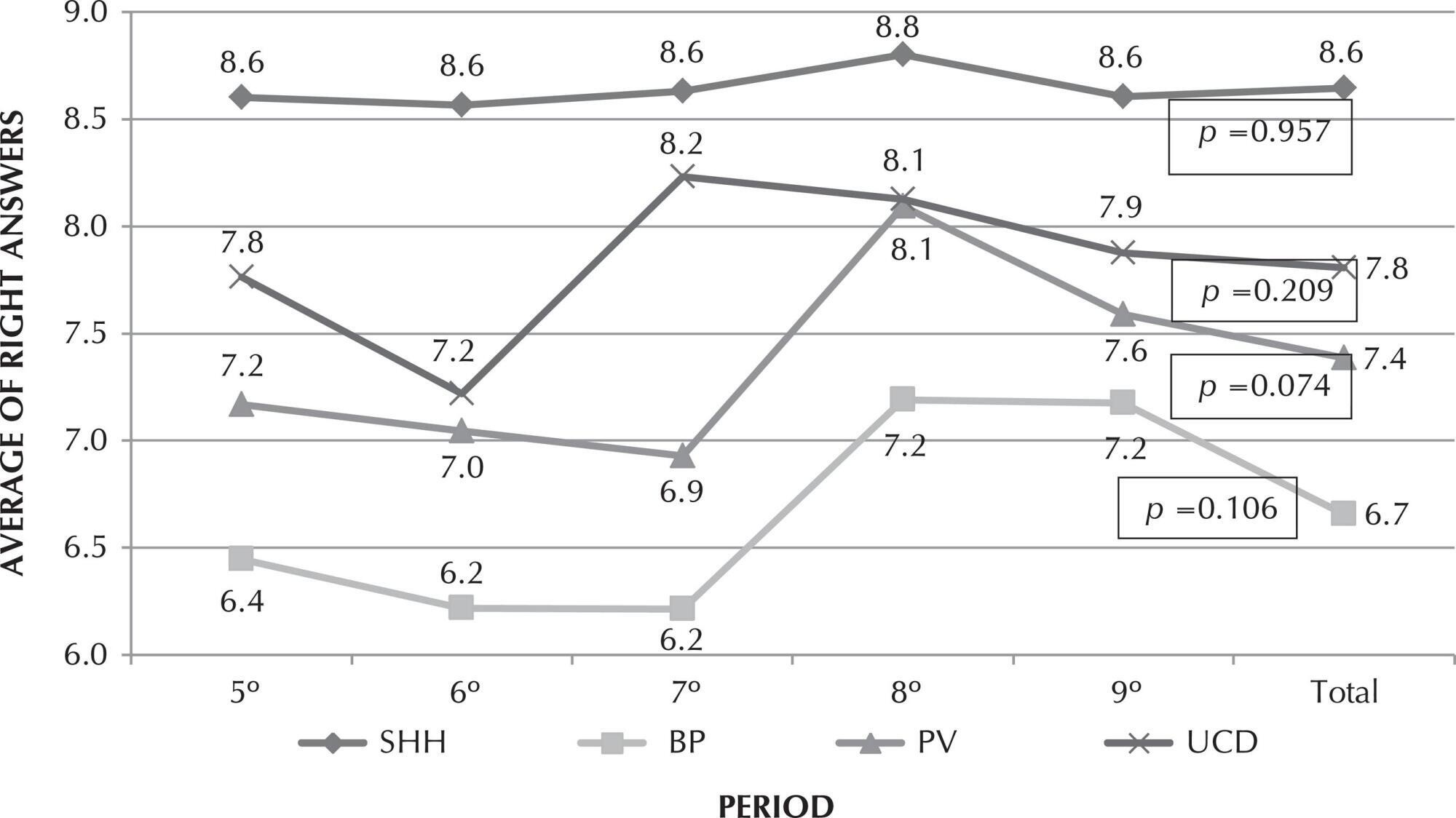
-
RESEARCH01-01-2017
Multi-professional team’s perception of nurses’ competences in liver transplantations
Revista Brasileira de Enfermagem. 2017;70(2):242-248
Abstract
RESEARCHMulti-professional team’s perception of nurses’ competences in liver transplantations
Revista Brasileira de Enfermagem. 2017;70(2):242-248
DOI 10.1590/0034-7167-2016-0223
Views0See moreABSTRACT
Objective
describe the multi-professional team’s perception of nurses’ competences in liver transplantation programs.
Method:
descriptive study with a qualitative approach. Data were collected through a questionnaire. Participants were 12 professionals of the liver transplantation team of a reference hospital. For result interpretation, the thematic analysis technique was employed.
Results:
the professionals assessed the competences employed by nurses as proactive, autonomous, creative, humanized, capable of teamwork, decision-making and conflict management.
Conclusion:
this study made it possible to demonstrate that members of the multi-professional team perceived nurses as professionals capable of coordinating and integrating the skills “knowing, doing, being and co-existing”, enabling quality care for candidates and receivers of liver transplants, as well as for their families and/or caregivers in all perioperative phases.
-
RESEARCH01-01-2017
The family in face of the elderly’s reality of living alone
Revista Brasileira de Enfermagem. 2017;70(2):235-241
Abstract
RESEARCHThe family in face of the elderly’s reality of living alone
Revista Brasileira de Enfermagem. 2017;70(2):235-241
DOI 10.1590/0034-7167-2016-0398
Views0See moreABSTRACT
Objective:
to understand the family dynamics in face of the reality of the elderly living alone.
Method:
study of qualitative approach with theoretical reference of symbolic interactionism that involved interviews with families. Data were analyzed by thematic analysis.
Results:
six families participated in the study. The discourse analysis originated the following categories: The family respecting their decision making; The family organizing itself to the process of living alone after the age of 80 years; The family experiencing the freedom of living alone.
Conclusion:
in this study, it was possible to identify the facilitation of the possibility of living alone with preparation and agreements between the family during the family life cycle, leading to the feeling of freedom and quality of life of all members. Nursing, as a science responsible for elaborating care strategies, should work together with families to assist in the planning of care plans based on the individual social reality of the family.
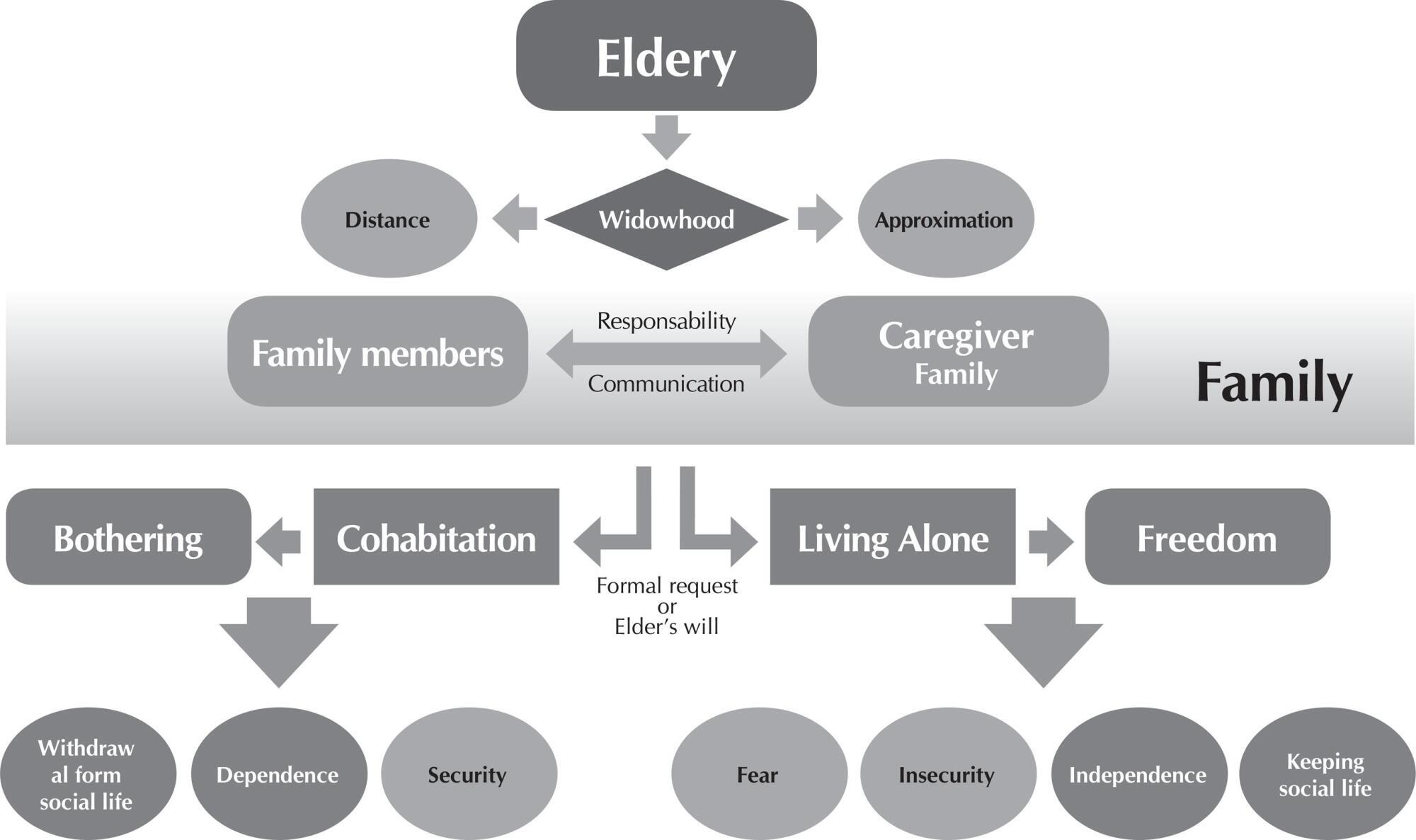
-
01-01-2016
Nursing instrument to attend mothers who recently gave birth in primary health care
Revista Brasileira de Enfermagem. 2016;69(2):316-325
Abstract
Nursing instrument to attend mothers who recently gave birth in primary health care
Revista Brasileira de Enfermagem. 2016;69(2):316-325
DOI 10.1590/0034-7167.2016690215I
Views0See moreABSTRACT
Objective:
To build a nursing instrument to attend mothers who have recently given birth in primary health care.
Method:
This is a methodological research developed in five stages: identification of empirical indicators associated with mothers who have recently given birth by reviewing integrative literature; evaluation of empirical indicators by focal group; instrument structuring by categorizing indicators; instrument validation using the Delphi technique; and application and development of diagnostic statements and nursing interventions.
Results:
The instrument comprises identification data on mothers who have given birth recently, on the assessment of their human needs, and on nursing Care items. In the final version, we selected 73 diagnoses and 155 nursing interventions.
Conclusion:
With the completion of this study, nurses will have an instrument for Nursing Care Systematization to attend mothers who have given birth recently in primary health care. Besides, this study will also work as a tool in research and teaching of Obstetric Nursing.
-
01-01-2016
Nursing diagnoses in intensive care: cross-mapping and NANDA-I taxonomy
Revista Brasileira de Enfermagem. 2016;69(2):307-315
Abstract
Nursing diagnoses in intensive care: cross-mapping and NANDA-I taxonomy
Revista Brasileira de Enfermagem. 2016;69(2):307-315
DOI 10.1590/0034-7167.2016690214i
Views0See moreABSTRACT
Objective:
to identify nursing diagnoses in intensive care unit (ICU) patients by means of a cross-mapping of terms contained in nursing records with the NANDA-I taxonomy.
Method:
an exploratory, descriptive study with a retrospective analysis of nursing records in 256 medical records of patients that were hospitalized in the general ICU of a hospital in the western border of the state of Rio Grande do Sul. Terms indicating conditions demanding nursing interventions were collected from the records; cross-mapping of these terms with the NANDA-I taxonomy diagnoses was performed and confirmed in a nursing focus group. Data were analyzed through descriptive statistics.
Results:
a total of 832 terms and expressions referring to 52 different diagnoses in 9 of the 13 domains of the NANDA-I taxonomy were identified.
Conclusion:
the present study enabled the identification of nursing diagnoses in patients hospitalized in ICUs, affecting care management, the training process of experts in the area, and information systems.
-
01-01-2016
Social network of adolescents under probation from the perspective of public health
Revista Brasileira de Enfermagem. 2016;69(2):298-306
Abstract
Social network of adolescents under probation from the perspective of public health
Revista Brasileira de Enfermagem. 2016;69(2):298-306
DOI 10.1590/0034-7167.2016690213i
Views0See moreABSTRACT
Objective:
to analyze the meaning of the social networks of adolescents who are under probation and to identify the essential components of these networks.
Method:
an exploratory study with a qualitative approach. Twenty-six teenagers, aged 13 to 18, participated in the study. For data gathering, the authors chose semi-structured interviews and network maps. Results: it became evident that social networks are essential for adolescents, with the family in a central position – especially the mothers – as well as the Centro de Referência Especializadode Assistência Social (Center for Specialized Reference of Social Assistance – CREAS) for social promotion and construction of new life projects, away from juvenile offending. However, adolescents reported no ties to health workers.
Conclusion:
the authors observed the need for nurses, as workers in primary health care, to practice in a way that is intersectoral and interdisciplinary, with the aim of strengthening the social networks of adolescents at conflict with the law.
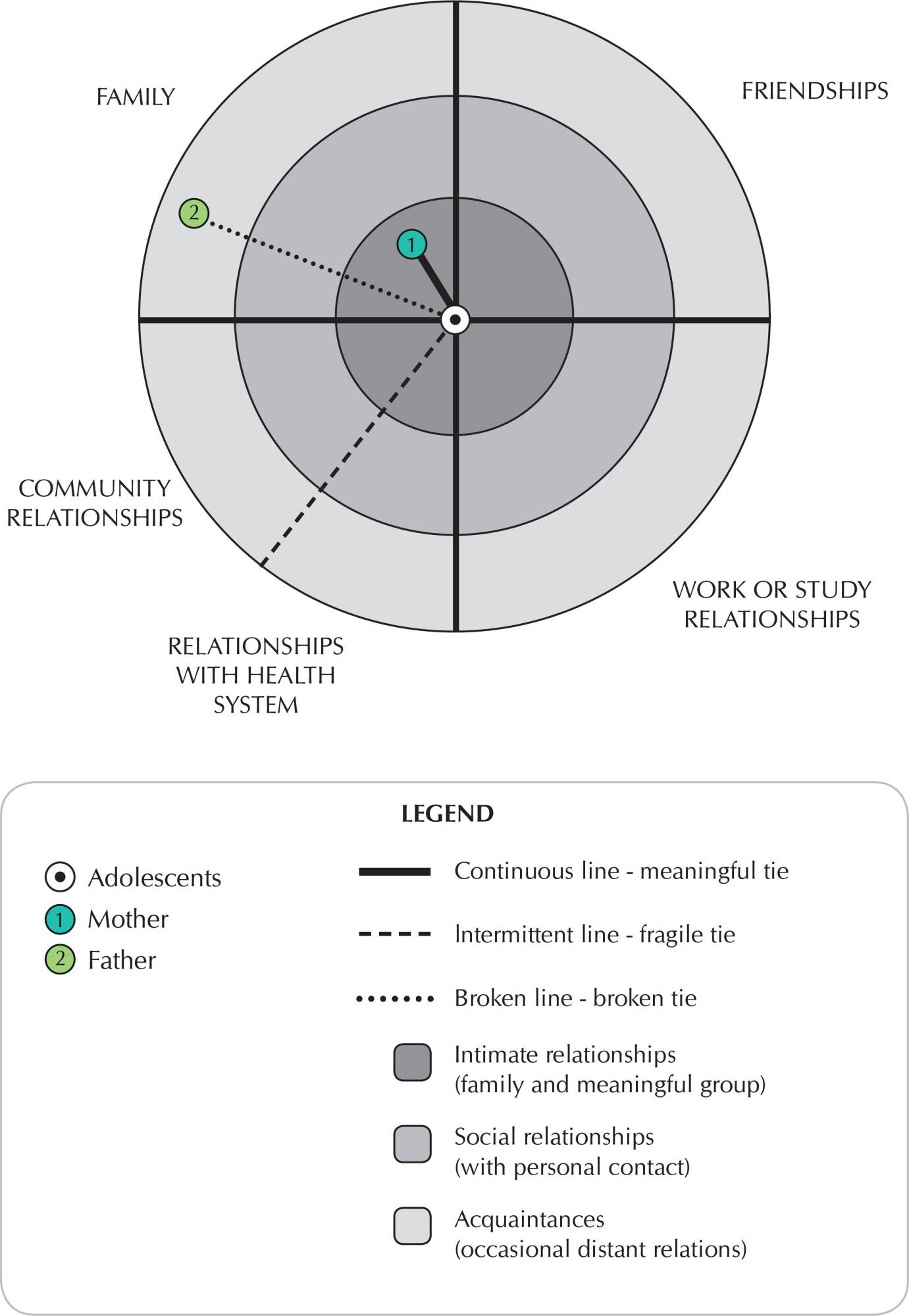
-
01-01-2016
Direct cost of dressings for pressure ulcers in hospitalized patients
Revista Brasileira de Enfermagem. 2016;69(2):290-297
Abstract
Direct cost of dressings for pressure ulcers in hospitalized patients
Revista Brasileira de Enfermagem. 2016;69(2):290-297
DOI 10.1590/0034-7167.2016690212i
Views0See moreABSTRACT
Objective:
to identify the average direct cost (ADC) on the direct labor (DL) for nurses and the consumption of materials and solutions used in performing dressings for pressure ulcers (PU) in hospitalized patients.
Methods:
case study, exploratory and descriptive case conducted in a teaching hospital. For six months, 228 dressings were performed for the treatment of PU patients. We calculated the cost by multiplying the time spent by nurses by the DL unit cost, adding to the cost of materials and solutions consumed.
Results:
the dressings ADC of PU corresponds to US$ 19.18 (PUs-category I); US$ 6.50 (PUs-category II); US$ 12.34 (PUs-category III); US$ 5.84 (PUs-category IV); US$ 9.52 (PUs-unclassifiable) and US$ 3.76 (PU suspected deep tissue injury).
Conclusion:
the methodology used can be reproduced in different hospital settings for the development of other studies to expand and complement the knowledge gained.
-
01-01-2016
Humanization knowledge of undergraduate nursing students
Revista Brasileira de Enfermagem. 2016;69(2):282-289
Abstract
Humanization knowledge of undergraduate nursing students
Revista Brasileira de Enfermagem. 2016;69(2):282-289
DOI 10.1590/0034-7167.2016690211i
Views0See moreABSTRACT
Objective:
identify the senses and practices representative of humanization in the training of undergraduate nursing students.
Method:
a qualitative study, supported on the national policy of humanization and the concept of social representation. An interview was conducted with 40 undergraduate nursing students from a public institution. ALCESTE software was used for lexical content analysis.
Results:
the sense of humanization is built on the practice and disciplines of social and human sciences. The coordination between theory and practice is representative of humanization, but does not take place in learning experiences. The professor’s participation and teamwork are elements that influence humanization.
Conclusion:
humanization should be reinforced in the training of undergraduate nursing students, using learning-teaching strategies and experiences that make sense to students, including alliances between theory and practice, learning and service, research and care.
-
01-01-2016
Prevention of vertical mother-to-child transmission of HIV: care and adhesion provided by couples
Revista Brasileira de Enfermagem. 2016;69(2):275-281
Abstract
Prevention of vertical mother-to-child transmission of HIV: care and adhesion provided by couples
Revista Brasileira de Enfermagem. 2016;69(2):275-281
DOI 10.1590/0034-7167.2016690210i
Views0See moreABSTRACT
Objective:
to unveil the existential movement of a couple when performing vertical HIV transmission prophylaxis.
Method:
qualitative research, using Martin Heidegger’s phenomenological approach. A phenomenological interview was conducted with 14 participants between December/2011 and February/2012 in the outpatient facilities of an university hospital, Brazil. A comprehensive and interpretative heideggerian analysis was developed.
Results:
the couple understands that they have followed the guidance of the health professionals as indicated. By not being able to breastfeed, the woman did not fail to be a mother, but it was also not a complete experience. The senses of the occupation of the couple-being unfolded to the prophylactic treatment and facticity due to the fact of not breastfeeding.
Conclusion:
we indicate the need to rethink care, proposing a working relationship that transcends the impersonal that dictates about what the couple must deal with, enabling their active participation in care decisions and actions.
-
01-01-2016
Attitudes and pleasure/suffering in mental health work
Revista Brasileira de Enfermagem. 2016;69(2):266-274
Abstract
Attitudes and pleasure/suffering in mental health work
Revista Brasileira de Enfermagem. 2016;69(2):266-274
DOI 10.1590/0034-7167.2016690209i
Views0See moreABSTRACT
Objective:
to investigate the existence of a relationship between attitudinal profiles and the pleasure/suffering dynamic in workers of Mental Health Services.
Method:
a quantitative, descriptive-analytical, correlational and cross-sectional study conducted in 2014. We used three instruments: characterization questionnaire, Opinions on Mental Illness Scale and Pleasure and Suffering Indicators at Work Scale, answered by 80 workers of the Network for Psychosocial Care of Alfenas, state of Minas Gerais, Brazil.
Results:
Authoritarianism proved to be the predominant profile. As for the pleasure/suffering at work, Gratification was considered adequate, and indicators such as Freedom, Wear and Insecurity were considered moderate critical. There were positive correlations between the most favorable attitudes and pleasure indicators at work. The values of both scales showed a relationship with socio-demographic and professional variables.
Conclusion:
the less favorable attitudes are prevalent and, in spite of suffering being present, these professionals feel gratified about their work.
-
01-01-2016
Overweight in young adult students: the vulnerability of a distorted self-perception of body image
Revista Brasileira de Enfermagem. 2016;69(2):258-265
Abstract
Overweight in young adult students: the vulnerability of a distorted self-perception of body image
Revista Brasileira de Enfermagem. 2016;69(2):258-265
DOI 10.1590/0034-7167.2016690208i
Views0See moreABSTRACT
Objective:
To analyze overweight in young adult students from the individual dimension of vulnerability, especially its interpersonal and subjective markers.
Method:
An analytical quantitative study was performed with 560 young adults from 26 schools in a capital city in Northeastern Brazil. After obtaining data to administer specific questionnaires, logistic regression was used to identify markers of individual vulnerability.
Results:
In the bivariate analysis, overweight showed a statistically significant association with self-perception of health, satisfaction with body image and self-perception of overweight, the latter remaining in the final regression model.
Conclusion:
It can be mainly concluded that self-perception of overweight is distorted when compared to one’s actual body weight and, for this reason, young adults are vulnerable to dysfunctional health states. However, it was confirmed that this health condition must be understood in an individual and contextual perspective.
Search
Search in:
Nuvem de Tags
Adolescente (85) Atenção Primária à Saúde (239) COVID-19 (91) Criança (91) Cuidados de Enfermagem (269) Educação em Enfermagem (151) Educação em Saúde (139) Enfermagem (930) Enfermagem Pediátrica (86) Estudantes de Enfermagem (77) Estudos de Validação (131) Família (87) Idoso (208) Promoção da Saúde (99) Qualidade de Vida (104) Saúde do Trabalhador (86) Saúde Mental (145) Saúde Pública (82) Segurança do Paciente (150) Tecnologia Educacional (100)



